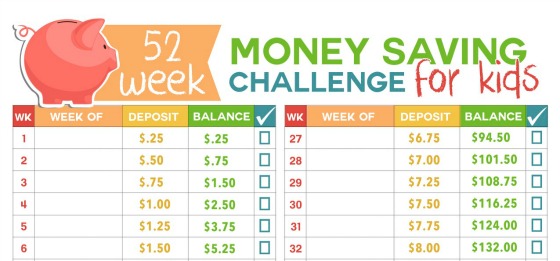12 Fun Summer Money Challenges for Kids
Now that the long days of summer are here, are you racking your brain for new and creative ways to keep the kids busy and entertained? These fun challenges can help you teach your children about the value of money.
According to a recent study, only 19 states in the U.S. currently require kids in K-12 public schools to take a financial literacy course before they graduate. That means that it’s up to you, the parents, to make sure your kids learn healthy financial habits and understand the basics of personal finance. Here are 12 great ways to get started.
Summer money challenges for kids
1. The coin-saving challenge
With this simple challenge, your kids can learn about the importance of saving money by working toward a specific goal. Whether it’s a PlayStation 5, a new skateboard, or a birthday present for Grandma, all they have to do is place any coins they earn or find into a jar until it all adds up to the price of the item.
Next, you’ll help the kids exchange their coins for cash. Depending on how old your children are, you may also want to challenge them to do the counting themselves — what better way to learn that patience can come with a payoff?
2. The 52-week money challenge
Part of the challenge when it comes to saving money is learning how to make it a regular habit. With the 52-week money challenge, your child starts by saving $.25 in the first week, and then increasing that amount by a quarter over the next 51 weeks (e.g., $.50 in week two, $.75 in week three, and so on). At the end of the year—if they’ve saved consistently every week—they’ll end up with $344.50.
“By simply growing just a quarter EACH WEEK for the entire year, your child can put away enough money for a savings account, to purchase family Christmas presents on their own, or add it towards a larger goal they may have,” says Stephanie Dirks, founder of the parenting website MomDot. “And because each week they need to earn just a bit more, they should be doing more work as well and understanding how hard work combined with savings can be the key to long term success!”

3. The 365-day money challenge
This challenge encourages kids to save a small but different amount of money every day for a year. They can use money they earned from household chores, a paper route, their allowance—even birthday checks from other family members (if that money isn’t specifically earmarked for a college fund, of course). It’s really up to them and you.
Here’s how it works:
Make or print out a chart that has 365 boxes in it, each with an amount between $.01 and $3.65. Each amount can only be used once on the chart for the entire year. For example, on January 1, your child might add $.05. On January 2, they might add $1.23. On January 3, they might add $.16 and so on.
Each day, your child will choose an amount, add it to their piggy bank or savings jar, and cross it off the list. If they commit to this process for 365 days, they’ll wind up with $667.95 by December 31.
4. The money-matching challenge:
For one month, task your kids with contributing any money they earn from doing chores, mowing the lawn, delivering papers, or any other odd job to a jar. On the last day of the month, have them count up the total amount and then match it.
Boom, your kids just doubled their earnings! (And learned the basic concept of investing.)
5. The good-habits challenge:
Want to teach your kids about money while also encouraging good habits? Give them certain challenges to fulfill in order to earn rewards in the form of cash. Challenges can be extra-curricular reading, performing certain chores — any healthy habit you feel comfortable rewarding monetarily. Not only will your kids earn money, but they might also find that they actually enjoy these wholesome activities — a win-win for you.
6. The no-spend weekend challenge
Entertaining children is big business. Advertisers know that kids are a captive audience, and they’re more than happy to base entire marketing campaigns around them! That’s why your child’s idea of a dream weekend — say, a day at Six Flags or Dave & Busters — inevitably seems to come with a sizable price tag.
Help your kids learn that fun doesn’t have to cost a thing by planning an exciting, money-free weekend. A game night, a treasure hunt, playing sports outside at the park, or a visit to the beach are just a few of the fun things you can do as a family — without reaching for your wallet.
7. The saving-for-a-cause challenge
Help your kids learn empathy and kindness by introducing them to the concept of charitable giving while they’re still young. Amanda Grossman, a mom, certified financial education instructor, and founder of the website Money Prodigy, recommends talking to your kids about your first donation and how it made you feel to get them excited about the idea of saving money for the good of others.
And don’t forget to put your money where your mouth is. “If you want your child to give cheerfully, then they need to see you giving cheerfully,” says Amanda. “Get out there and be the person you want your child to be (just make sure they see it).”
8. The dinner-budget challenge
With this challenge, your kids will be responsible for planning, purchasing, and making dinner for the whole family using a budget set by you. Let them choose what they want to make and then have them put together their own shopping list. Next, drive them to the store and let them choose all the ingredients (under your supervision of course — they’ll probably need help reaching some of those high shelves). They can even use a calculator and compare prices as they go.
Not only will your kids get to create a budget all on their own, but they’ll also learn (hopefully!) that the First National Bank of Mom and Dad has its limits — even when it comes to something as commonplace as preparing a meal.
9. The contest challenge
Did you know there are quite a few creative contests kids can enter to win cash prizes? Whether your child is an aspiring author, a budding artist, or a whiz at science, there’s a contest out there geared to his or her particular talents. This is a great way to encourage your kid to fuel their passions — and even begin to monetize their skill sets!
10. The “Big Kahuna” savings challenge
This is another money-matching challenge, but with a twist. For the Big Kahuna savings challenge, your kids will need to choose a big ticket item (e.g., a concert, a trip to Disneyland) and then research the cost. Tell them that if they can save up and pay for half, you’ll match them by paying the other half. They’ll have fun working toward a goal that offers a big reward at the end and learn that saving money for something you really want takes focus and discipline.
11. The five-day grocery shopping challenge
This challenge is all about the benefits of budgeting. For five days, put your tween or teen kids in charge of family meals and give them a budget. At the end of five days, anything they don’t spend they get to keep and divide up evenly.
Pro tip: You may want to include some simple parameters so don’t find yourself eating spaghetti with ketchup or peanut butter and gummy bear sandwiches all week.
12. The online gaming challenge (yes, really!)
Chances are your kids are already obsessed with technology. Though it’s important to limit their screen time, you can also encourage your kids to spend their time online more constructively.
If they’re already into online games, you’re in luck. From Peter Pig’s Money Counter, to Financial Football, to the Best Brokers app, there are plenty of apps and websites out there that are designed to help kids learn about money.
What can your kids learn this summer?
The idea behind all these challenges is to get your kids on the path to financial literacy early by making the journey exciting and rewarding — not a boring chore that offers them no real benefits. While your kids are learning and having fun, you can rest easy knowing that you’re preparing them for a better financial future.
Quicken has made the material on this blog available for informational purposes only. Use of this website constitutes agreement to our Terms of Use and Privacy Policy. Quicken does not offer advisory or brokerage services, does not recommend the purchase or sale of any particular securities or other investments, and does not offer tax advice. For any such advice, please consult a professional.



